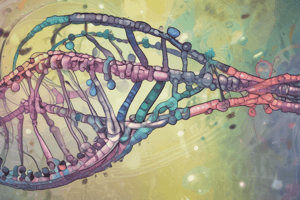Podcast
Questions and Answers
What is the primary role of chromosomes within the nucleus?
What is the primary role of chromosomes within the nucleus?
- To carry genetic information (correct)
- To determine the shape of the cell
- To facilitate cell movement
- To produce energy for the cell
How many total chromosomes are found in human somatic cells?
How many total chromosomes are found in human somatic cells?
- 46 individual chromosomes (correct)
- 23 pairs
- 22 pairs plus 1 chromosome
- 21 pairs plus 4 chromosomes
What distinguishes haploid cells from diploid cells?
What distinguishes haploid cells from diploid cells?
- Diploid cells only carry genetic information from one parent.
- Haploid cells contain half the number of chromosomes. (correct)
- Haploid cells have two copies of each chromosome.
- Diploid cells are involved in sex determination.
Which statement about homologous chromosomes is true?
Which statement about homologous chromosomes is true?
What is a karyotype?
What is a karyotype?
Which type of cell division produces gametes?
Which type of cell division produces gametes?
Which chromosomes determine the sex of an individual in humans?
Which chromosomes determine the sex of an individual in humans?
Which organism has the highest known number of chromosome pairs?
Which organism has the highest known number of chromosome pairs?
What is the role of sister chromatids during cell division?
What is the role of sister chromatids during cell division?
During which stage of the cell cycle do chromosomes replicate?
During which stage of the cell cycle do chromosomes replicate?
What occurs during the prophase stage of mitosis?
What occurs during the prophase stage of mitosis?
What is the main purpose of cytokinesis?
What is the main purpose of cytokinesis?
Which stage involves the microtubules pulling sister chromatids apart?
Which stage involves the microtubules pulling sister chromatids apart?
What primarily occurs during the G2 phase of the cell cycle?
What primarily occurs during the G2 phase of the cell cycle?
How many chromosomes do adult humans typically have?
How many chromosomes do adult humans typically have?
What marks the end of interphase in the cell cycle?
What marks the end of interphase in the cell cycle?
Flashcards are hidden until you start studying
Study Notes
Chromosomes and Genetic Background
- All organisms consist of cells; humans have approximately 100 trillion cells.
- The nucleus contains chromosomes, critical for genetic information.
- Somatic cells in humans are diploid, having 23 pairs of chromosomes (46 in total).
- A karyotype displays stained chromosomes, arranged systematically for analysis.
- Chromosomes 1-22 are autosomes; X and Y are sex chromosomes involved in sex determination.
- Gametes (sperm and eggs) contain a haploid set of chromosomes (one of each type).
Cell Division Overview
- Around 25 million cell divisions occur in an adult human body at any moment.
- Major types of cell division include mitosis (for growth and repair) and meiosis (for reproduction).
- Mitosis is responsible for splitting one cell into two, redistributing genetic material evenly.
Chromosome Structure and Organization
- DNA forms chromosomes, which consist of chromatin (DNA and proteins).
- Chromosomes condense before division; humans have 23 pairs (46 total).
- Homologous chromosomes are pairs that share similar size and function.
- Exceptions: males have one X and one Y chromosome, while females have two X chromosomes.
Chromosome Variation Across Species
- Different organisms have varying chromosome counts:
- Onions: 8 pairs
- Fruit flies: 4 pairs
- Cats: 19 pairs
- Dogs: 39 pairs
- Myrmecia pilosula: 1 pair
- Ophioglossum reticulatum: 630 pairs
Mitosis Process and Cell Cycle
- Mitosis is crucial for growth (from zygote to baby), tissue repair, and asexual reproduction.
- Cell cycle consists of interphase (G1, S, G2) and mitosis.
- G1: normal cell function
- S: DNA synthesis (chromosome replication)
- G2: preparation for division
- Mitosis stages include:
- Prophase: Chromosomes condense, nuclear envelope breaks down.
- Metaphase: Sister chromatids align at the metaphase plate.
- Anaphase: Microtubules separate sister chromatids to poles.
- Telophase: New nuclear membranes form, chromosomes de-condense.
Cytokinesis
- Cytokinesis occurs after mitosis, where cell membranes pinch off, resulting in two identical daughter cells.
- Mitosis ensures the precise distribution of genetic information to new cells, critical for maintaining genetic integrity.
Studying That Suits You
Use AI to generate personalized quizzes and flashcards to suit your learning preferences.




